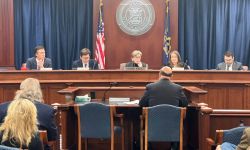GOP leader on Michigan budget woes: ‘We just need to suffer through it’

LANSING – Michigan may not get any more help from the federal government to balance a projected multibillion budget deficit by October, and that’s not necessarily a bad thing, according to the most powerful Republican in the state Legislature.
“I think we need to learn to live within our means,” Senate Majority Leader MIke Shirkey, R-ClarkLake, said this week in a radio interview on WKHM in Jackson, blaming Democratic Gov. Gretchen Whitmer for closing businesses to fight the COVID-19 pandemic.
- The latest: Michigan coronavirus unemployment, map, curve, updated COVID-19 news
- Dashboard: Michigan coronavirus testing numbers, trends, COVID-19 data
“Some states have crippled their economies, like Michigan, based on the actions taken, and we just need to suffer through it for a cycle or two until the economy gets back on track,” he said.
Shirkey’s comments drew swift condemnation from Democrats. They argue Whitmer’s actions saved lives and are urging Congress to provide more assistance to help states like Michigan avoid steep budget cuts, potentially to services that citizens rely on.
“This flippant disregard for human life and loss in Michigan is dangerous and destructive,” Lt. Gov. Garlin Gilchrist said in a statement. “I have lost 23 people to COVID-19. We must put all hands on deck and all resources on the table to prevent people from getting sick, care for those who do, and stop anyone else from dying.”
A Shirkey spokesperson did not reply to Bridge’s request for additional comment.
The U.S. Senate this week adjourned through at least Labor Day without approving another round of COVID-19 relief. The Democratic-led House approved a $3 trillion relief package in May that included additional funding for states, but Congress and the Trump administration have been unable to reach agreement on a consensus plan.
Some congressional Republicans do not want to provide more assistance to local governments, who already received $150 billion total in COVID-19 relief funding in April. Michigan used most of its roughly $3 billion to balance the state budget for the current fiscal year.
Shirkey, a business owner whose company qualified for at least $1 million in federal rescue funding this year, said he does not think the federal government should “continue to print money and bury our future generations in even more enormous debt.”
The only additional federal funding for the state he would welcome, Shirkey said, would be “some very strategic, targeted money for safety equipment for schools” as they begin the academic year in a pandemic.
Whitmer, in a Friday press briefing, called on the Trump administration to “step up” with additional funding for states like Michigan “so we can send more resources to our classrooms to keep our kids and our educators safe.”
Congress has also been unable to reach agreement on extended unemployment benefits.
President Trump on Saturday signed an executive order that would provide unemployed residents with an extra $400 a week during the pandemic, down from the $600 a week the federal government had provided through the end of July. But the order is expected to face legal challenges and would require cash-strapped states to cover a quarter of the cost.
Michigan budget makers got some good news Thursday when the Senate Fiscal Agency reported that tax collections strongly rebounded in July after having cratered in prior months, partly because of delayed deadlines.
Officials in May lowered tax collection projections by more than $3 billion for both the current and upcoming fiscal years. But through the end of July, the state this year had collected about $1.1 billion more than estimated, the fiscal agency reported Thursday.
That could leave the state with closer to a $2 billion budget gap for the fiscal year that begins Oct. 1. Officials will revise their estimates in late August before Whitmer and GOP leaders work to finalize negotiations on a balanced budget, as required by the Michigan Constitution.
“It’s going to be a very challenging process,” Shirkey said in the radio interview. “A lot of adjustments [will be] made that are going to affect people, especially since it looks like the federal government is going to be reluctant to make… any additional significant investment in the state.”
While Michigan Republicans have criticized Whitmer for locking down the state economy earlier and longer than some other governors, the budget crunch is not unique to Michigan.
Moody’s Analytics in June estimated that states collectively need about $120 billion in federal assistance to avoid government layoffs and cuts that could cost 4 million jobs nationally.
The National Governors Association, a bipartisan group, has called on Congress to send states an additional $500 billion to fill budget shortfall. Local government groups have urged additional funding as well.
“Due to Congress’ inaction, the ability of state and local governments to deliver critical services to the American people is now in serious jeopardy, along with the jobs of millions who work in schools, libraries, police and fire departments, hospitals, road and transit agencies, and other units of state and local government," the group said Thursday in a joint statement.
"Only the federal government, with its central bank, the world’s reserve currency, and unlimited borrowing authority, has the power to avoid these devastating consequences. It is unconscionable that our federal leaders have failed to act.”
Michigan's economy was hit harder than most states early in the pandemic. This spring, it had some of the largest case counts in the country and Whitmer issued broad stay-home and business closure orders. Once third in the nation, Michigan is now out of the top 15 for states in total cases with about 90,000.
Michigan's unemployment rate peaked at a record 22 percent in April, which was the second highest rate in the nation. It dropped to 14.8 percent in June, which still ranked sixth highest in the nation.
But the state economy has rebounded, at least to a small degree, and is now performing better than some peers.
Overall consumer spending in Michigan is up 3.1 percent over January levels, according to economic tracker data compiled by researchers at Harvard and Brown universities.
On that measure, Michigan is doing better than states including Georgia and Florida, who took less aggressive actions to fight COVID-19 and were hit hard by the virus in July. Consumer spending in both of those states is down more than six percent compared to January.
Consumer spending on arts, entertainment and recreation is still down by more than 40 percent in Michigan, where movie theaters and sports stadiums remain closed to the public, but that's less than the 50 percent reduction that sector has seen nationwide.
“Georgia was the first state in the country to reopen its economy and is now averaging five times [as many] new cases of coronavirus in a day than the state of Michigan,” Whitmer said Friday, arguing her executive orders have benefited both public health and the economy.
“I don’t think anyone in Florida would question that it would be better to be a Michigander right now than a Floridian, because of the stronger position we’re in, the lives that we’ve saved and the crisis that they are still in the midst of,” she said.
See what new members are saying about why they donated to Bridge Michigan:
- “In order for this information to be accurate and unbiased it must be underwritten by its readers, not by special interests.” - Larry S.
- “Not many other media sources report on the topics Bridge does.” - Susan B.
- “Your journalism is outstanding and rare these days.” - Mark S.
If you want to ensure the future of nonpartisan, nonprofit Michigan journalism, please become a member today. You, too, will be asked why you donated and maybe we'll feature your quote next time!




